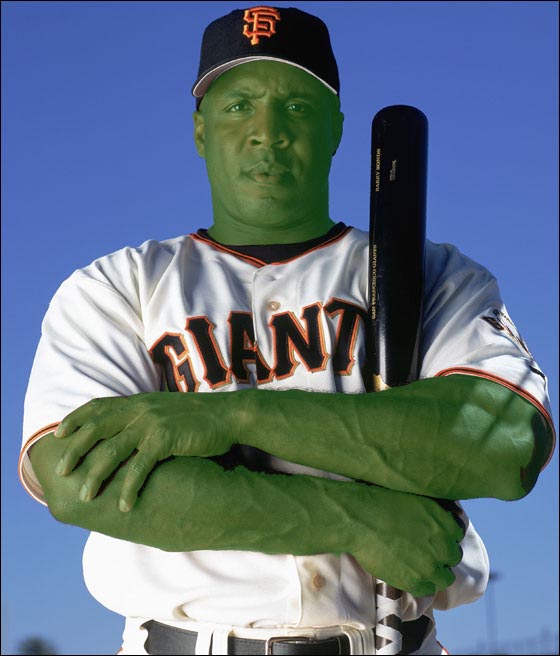Check out the big head on Barry
 The second (or third?) segment of drug war spurred by the BALCO findings has come into the forefront and this one is just as much a tangled web as a David Lynch film. This time, celebrities, athletes and team training staffs are in the mix. Included here is Gary Matthews Jr., who went from a player who was released five times and traded twice before landing on a $50 million deal with the Los Angeles Angels.
The second (or third?) segment of drug war spurred by the BALCO findings has come into the forefront and this one is just as much a tangled web as a David Lynch film. This time, celebrities, athletes and team training staffs are in the mix. Included here is Gary Matthews Jr., who went from a player who was released five times and traded twice before landing on a $50 million deal with the Los Angeles Angels.But everyone’s attention has been squarely focused on Barry Bonds, who apparently went through a middle-aged growth spurt according to the authors of the book Game of Shadows. In the new afterward of the newly-released paperback edition, authors Lance Williams and Mark Fainaru-Wada write that Bonds – upon joining the Giants from the Pirates – went from a size 42 to a size 52 jersey; from size 10½ to size 13 cleats; and from a size 7 1/8 to size 7 1/4 cap, even he shaved his head.
The authors write:
“The changes in his foot and head size were of special interest: medical experts said overuse of human growth hormone could cause an adult's extremities to begin growing, aping the symptoms of the glandular disorder acromegaly.”
Yet as Tom Verducci points out on the Sports Illustrated web site, Bonds and his legal team have never, ever challenged the facts of Game of Shadows. In fact, all they have done is point out that the authors used leaked grand jury testimony and attempted to block the authors from accepting profit from the sales of the book.
But the content of the book? The facts? They didn’t touch it.
Contrast that with Lance Armstrong, the seven-time Tour de France winner who has faced all sorts of drug doping allegations ever since he rode into the Champs-Élysées for the first time. When books, reports or even idle chatter popped up accusing Armstrong of using EPO, steroids, HGH or whatever, he sued. He went after the accusations the way he attacked the Alps in the Tour. Armstrong even went after World Anti-Doping Agency zealot Dick Pound, asking the International Olympic Committee that the WADA head be “suspended or expelled from the Olympic movement.”
 The IOC agreed and offered a stern rebuke.
The IOC agreed and offered a stern rebuke.Meanwhile, what did Bonds do when he tested positive for amphetamines? Yeah, that’s right, he blamed a teammate… then backed off… and now it’s something he doesn’t want to talk about because “it’s in the past.”
Why shouldn't it be for him? After all, if Bonds is indicted and the Giants void his contract, the Major League Players Association will have his back...
Drug use in sports, however, is not in the past. It’s not going away – it’s sitting right there in your living room waiting for you and your sports-loving fans to determine if it’s up to them to make a decision.
Is this going to stand or not? The people have the power... right?
Arthur Schlesinger Jr.
We would be remiss not to note the passing of Pulitzer Prize-winning historian Arthur M. Schlesinger Jr. For those with an interest in American history, Schlesinger undoubtedly has a section on your bookshelf.
Schlesinger's The Age of Jackson won the Pulitzer Prize in 1946 when he was just 27. His biography of Robert F. Kennedy that was especially memorable, especially the last three chapters.
Labels: Barry Bonds, drugs, Lance Armstrong



0 Comments:
Post a Comment
<< Home